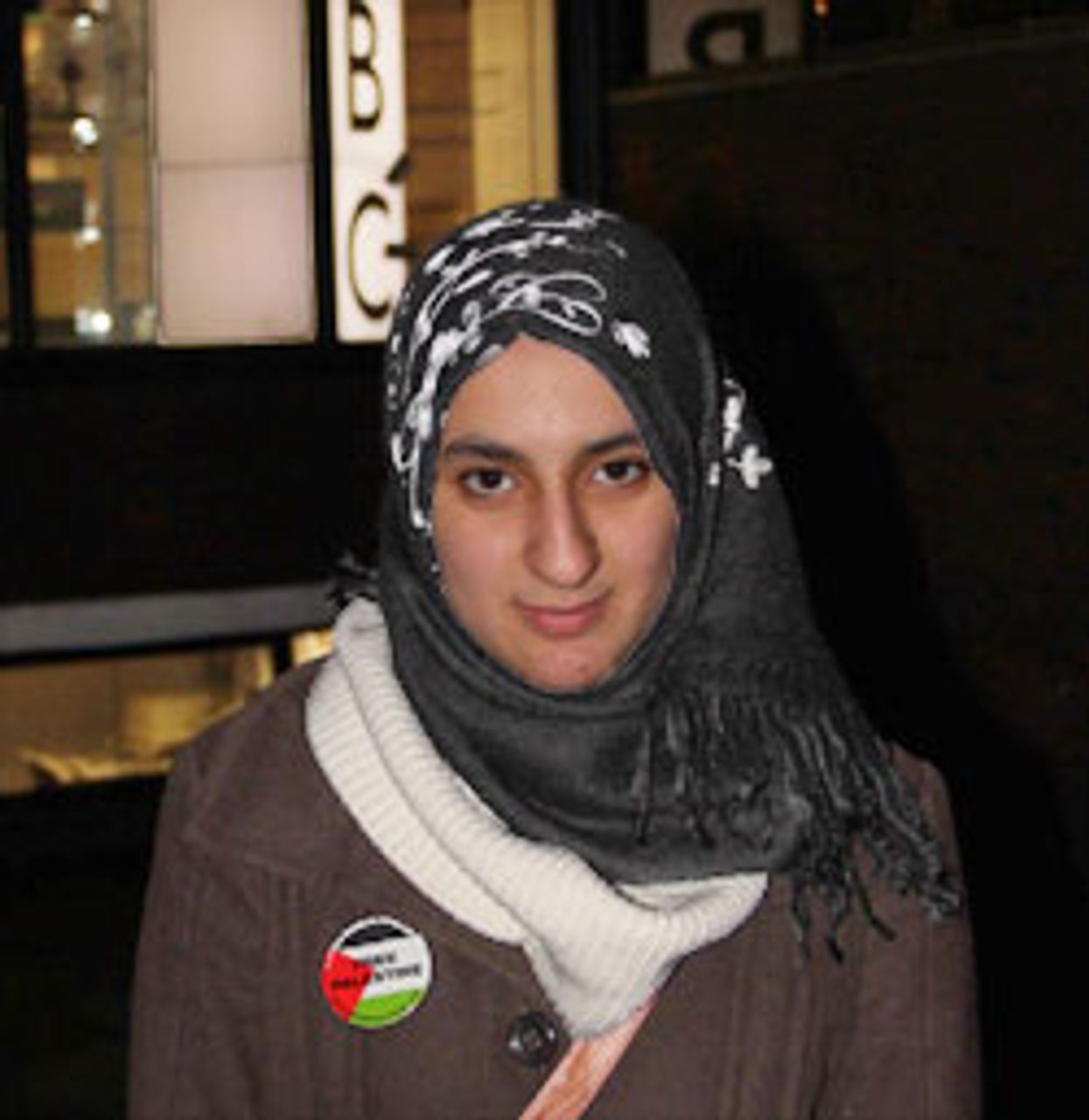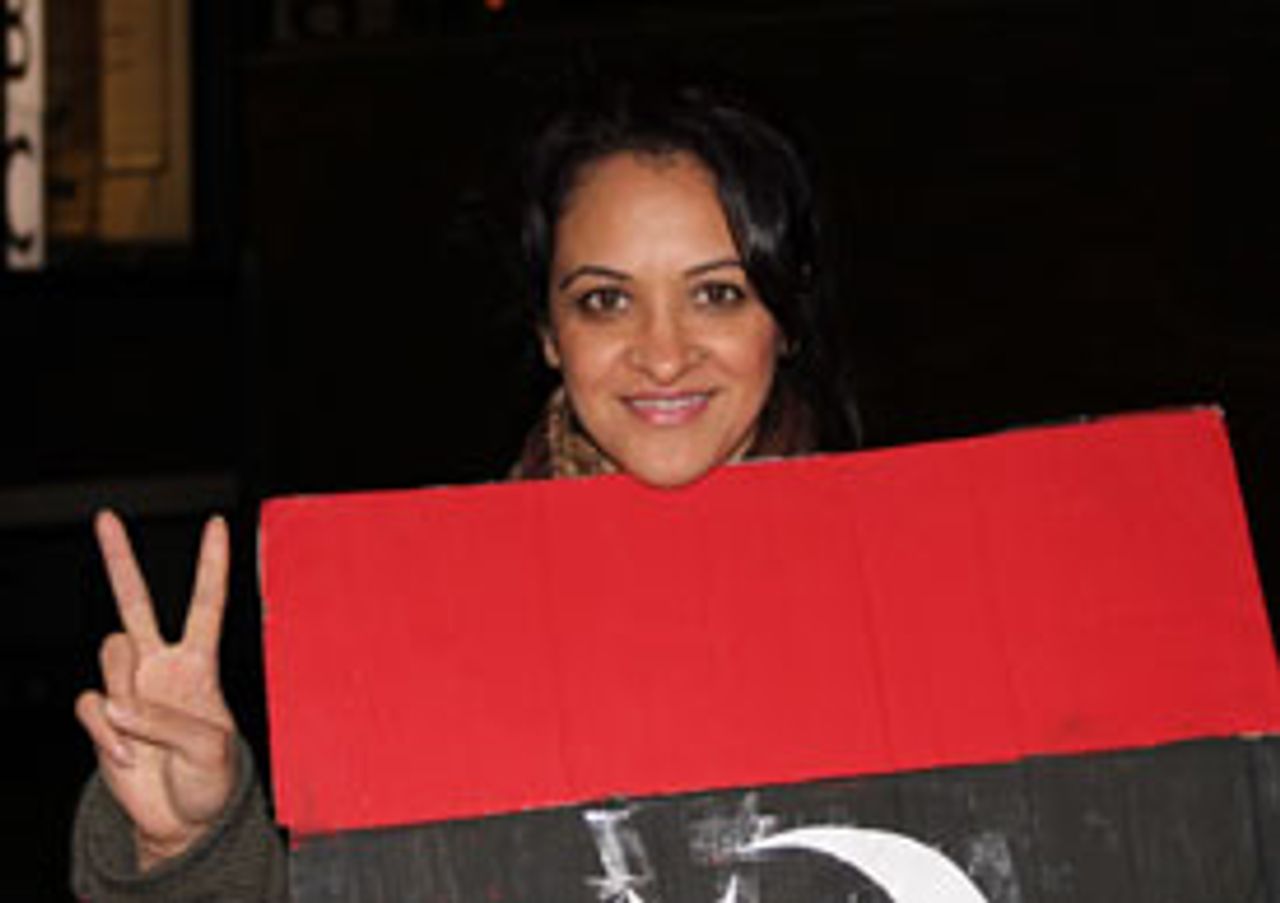Protesters are holding regular demonstrations outside the BBC’s HQ in Manchester city centre in north-west England against the Gaddafi regime.
Protesters have been outside the BBC for several days, with several hundreds protesting on Sunday. Manchester is home to several thousand Libyans, the second largest population of Libyans in the UK after London. Many came to the city in search of political asylum, after having fled the regime of Muammar Gaddafi.
Early Tuesday, eight coaches of people left Manchester to support protests in London demanding the end of Gaddafi’s rule. Around 3,000 people protested in London outside Downing Street and at the Libyan Embassy.
A World Socialist Web Site reporting team spoke to some of those protesting in Manchester.
 Abrar
AbrarAbrar is a college student. She said, “I am protesting because I have seen what is going on in Libya and from Twitter and so on. I am a Palestinian and I know what it is like to be oppressed and what it’s like for your family to be oppressed and in danger.
“I am here to show solidarity, to show that we are here for the Libyan people. The world is not going to be silent about this. We have had a few protests outside the BBC here. I went to one on Sunday and that was quite big. I heard the one yesterday was also a good turnout. The BBC has become a place where we hold protests now, because it’s on Oxford Road [a main arterial road in the city] and lots of people are going to see it.
“I think the revolutions in the region have been brewing for some time. People are saying it started with the barrow boy in Tunisia who killed himself by setting himself on fire. But it’s been in the background longer than that. People just needed a reason to come out. The guy who set fire to himself was the straw that broke the camel’s back. People have been looking for something to kick start it.
“The difference between Libya and Tunisia and Egypt is that the repression will be a lot worse in Libya. Gaddafi has been in power a long time and I think he is really insane. But I still think the people in Libya will achieve the same things the people in Egypt and Tunisia have. Gaddafi has just spoken and said there is a lot more to come so it is going to be very difficult for the people. But eventually if the people continue to fight it is just a matter of time before we win.
“After Libya, I hope it will continue and that everyone will follow. As the people in these countries rise up, it will make it easier for people in other countries to follow them.
“Prime Minister David Cameron is now telling the Egyptian people that ‘we are here for you and supporting the revolution’. But a few weeks ago he was saying nothing. And now he is over there selling arms. I think he has been very two-faced about it.
“They change their tone depending on the situation. I don’t really trust anything that the UK or the US says. They are all really wolves in sheep’s clothing.”
 Parveen
ParveenParveen Yaqub said, “The reason I am here is to support the Libyan people in their struggle to bring down the oppressive regime. I was also here at protests to support the Egyptian people in the revolution. These revolutions are now gathering momentum in the Middle East and I want to show my support for the revolution in Libya.
“The ordinary people have had enough and it is really one collective action spreading across the Middle East. I’m sad it hasn’t happened until now. But it’s here now and it’s a defining moment in history. People have had enough of being force-fed western foreign policies, of being lied to. They are beginning to stand up for themselves and find their voice.
“We are at the point of no return and people have begun to re-establish their voice and courage and identify with each other. It’s really powerful that people in different countries can see they are not alone and together in a collective international response to these repressive regimes. They are able to wield their own power.
“People just want to have a peaceful life and future for their children. They have tried every other means possible and this is the last resort. The elite have tried to keep everything they have away from the working class.
“Last year I was involved in the flotilla to try to break the siege on Gaza and I think that this has had quite an impact in exposing the US, UK and the west in the Middle East.
“There is a lot of wealth in these countries but it has been disproportionally distributed and this has been particularly harsh on the young people.
“I am absolutely appalled that Gaddafi has said he will not go. He is now talking about destroying the country if necessary. What he is talking about amounts to genocide. Hundreds have already been killed.”
When asked about whether she knew of the large scale demonstrations taking place in Wisconsin in the United States, where tens of thousands of workers are protesting drastic budget cuts. She replied, “I think a benchmark has been set here. An amazing revolution is taking place in the Middle East and against the most oppressive, regimes. And if it can happen in the Middle East, well, I am sure people in America can replicate the stance of the Egyptians and Libyans.
“What worries me is, who are Mubarak and Gaddafi, if he falls, going to be replaced with? I don’t for a second think it is going to be someone fairly and democratically elected by the people. That would be naive. This is the Middle East we are talking about. This is a stronghold of Israel, by proxy, through America’s support and protection. They will be freaking out about this and will react. And in Israel’s case that usually involves some very violent and repressive actions.”
A Libyan man in political exile who works in the National Health Service said, “Gaddafi should have been gone for a long time. I don’t think he plans to go without a lot of dead. I think more than a 1,000 people have been killed in the struggle so far, no question. And these include a lot of officers who have been executed because they refused to shoot their own people.
“The people in Libya deserve the same freedom that we have here. Gaddafi will have to leave, but will try to kill as many as he can. He may kill thousands and thousands. He has a slogan: ‘God, Gaddafi and Libya’, so he has himself second to God.
“He should be put on trial. There is a Libyan lawyer in France who has already collected a big file on his crimes.
“I heard Gaddafi’s son talking about Libyans here in Manchester protesting, and that the revolution is based on foreign interference. Basically we have to support the revolution from here because we can’t be directly involved in it. We are the second largest Libyan community in Britain, behind London. The regime is very sensitive to any protest and does not want anyone to oppose him.
“The problem we have is that there is a complete blackout in Tripoli. We don’t know who has been killed. The people are willing to pay with their lives as long as Gaddafi is gone. He is desperate and he is in his final days.”
 Aysha right and Nusiba centre
Aysha right and Nusiba centreAysha’s father came to Manchester as an exile when he was a young man. She said, “We all heard Saif Gaddafi’s [Muammar Gaddafi’s son] speech. He specifically mentioned the protests in New York, London and Manchester. This is a victory for us. They have been forced to acknowledge all the protest against them and the people all know about it now.”
Her friend Nusiba said, “When Saif made this speech, it was shown on big screens in Libya and the people all threw shoes at his face. His regime is over. If you look at Gaddafi’s speech today, he was panicking. There was nothing cohesive, it was all rambling.”
Aysha said, “Our families were all were forced out of Libya. The people in Libya know what he is saying about outsiders trying to invade is not true. The people there have family here. I have only been to Libya once in my life. And a lot of people here haven’t actually been to Libya. My friend has never seen her family.”
Nusiba then added, “The Libyans in Manchester were all basically forced to leave and had to apply here for political asylum. There is a massive community here and in London and in the US and in Germany. There are millions who have been forced into exile.
“We have passed the point of no return in Libya. They are not going back to that persecution any more.
“The whole of my family lived in Benghazi and they have all volunteered for the Red Cross. Nurses have been fainting because of what they have been seeing. They have been using weapons that are normally used against aircraft, against people. Their bodies are split in half. Some videos of people cut in half by these weapons have been removed from YouTube because they are so gruesome.
“He is now bombing his own people. He is bombing cities. I have never seen a leader who bombs his own country, his own people. There are only five million people in Libya anyway. That is an entire generation being depleted, the longer he stays.”
Aysha said, “I hadn’t seen Libya until two years ago and I am 20 now. So I never saw it until I was 18. My father had to flee Libya when he was only 21 and he never saw his family until two years ago. He got sent to prison on his graduation day. I was lucky to see my family because if anything happens to them, at least I have that memory.”
Fill out the form to be contacted by someone from the WSWS in your area about getting involved.
